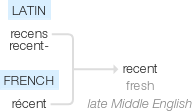Recent
late Middle English (in the sense ‘fresh’): from Latin recens, recent- or French récent .
wiktionary
Borrowed from Latin recēns (genitive recentis). As classifier for a geological epoch coinciding with human presence (“Recent era”) introduced by Charles Lyell in 1833. [1]
etymonline
recent (adj.)
early 15c., "recently made," of foods, etc., "fresh, newly made," from Latin recentem (nominative recens) "lately done or made, of recent origin, new, fresh, young," from re- (see re-) + PIE root *ken- "fresh, new, young" (source also of Greek kainos "new;" Sanskrit kanina- "young;" Old Irish cetu- "first," Breton kent "earlier;" Old Church Slavonic načino "to begin," koni "beginning").
Meaning "of or pertaining to the time just before the present" is by 1620s. Related: Recently; recentness ("state or quality of being recent," 1670s, but OED reports recency (1610s) was "Common in 19th c.").
